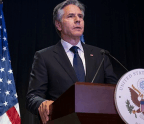'What To The Slave Is The Fourth Of July?' Frederick Douglass, Revisited

"What to the slave is the Fourth of July?" posed Frederick Douglass to a gathering of 500-600 abolitionists in Rochester, N.Y., in 1852. Admission to the speech was 12 cents, and the crowd at the Rochester Ladies' Anti-Slavery Society was enthusiastic, voting unanimously to endorse the speech at its end. This speech would be remembered as one of the most poignant addresses by Douglass, a former slave turned statesman. Douglass gave it on July 5, refusing to celebrate the Fourth of July until all slaves were emancipated.
On July 3, 165 years later, the same question was posed on a stage in the basement of the National Archives, in Washington, D.C. This time by, which hosts an annual reading of the speech, entitled .
You’re reading a preview, subscribe to read more.
Start your free 30 days





